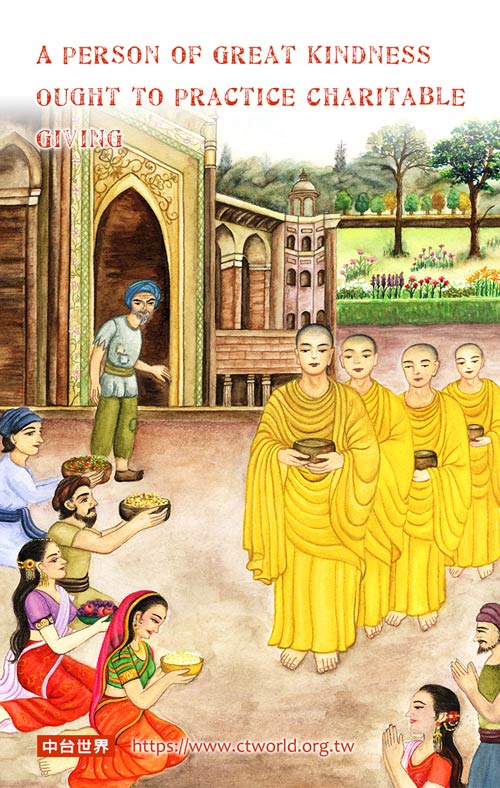
One day, King Prasenajit visited the Buddha. After prostrating, he told him, “World Honored One! There is an elder named Mahamana, who has so much money that he could be called well-to-do.
The Buddha asked the king, “Why would he be called well-to-do?”
King Prasenajit replied, “Because this elder has countless millions of gold, silver, and treasures, not to mention his many other assets. However, it is strange that even though this elder is wealthy, his garments and food are incredibly simple and unsophisticated. For example, his diet consists of simple dishes of unprocessed rice and bran cooked with ginger. Not only that, he is so stingy that he resells the used and cooked ginger slices for money. His clothes are made with cheap, low-quality fabrics. The old carriage he takes has tree leaves for a canopy. It is so old and used up it is basically junk. No one has ever seen him offer even a little bit of money to the sangha or to the poor. As soon as meal time approaches, he closes his door, afraid that monks and Brahmans will come to him for alms.
The Buddha told King Prasenajit, “Your Majesty, although people like this have money, they cannot be considered people who do good. Why is this so? For that man has amassed great wealth, but cannot make good use of it. Not for himself; not for his parents, mentors, or elders; not for his wife and children; and not for his servants. Not only is he miserly in making offerings to the sangha, but also refuses to use his wealth to accumulate merits and blessings for future lives. This is just like an area where salt is produced. Although there are sources of water, the water is bitter and undrinkable. Eventually, the water will dry up. Aren’t some people in the world equally as foolish? Although they feel joy from gaining wealth, they are stingy in providing for their parents and elders, and in taking care of their wives and families. They are unwilling to treat their servants well, or extend help to their families and friends. What use is wealth for such people?
The Buddha added, “A truly virtuous man is one who, having obtained wealth, is still willing to practice charitable giving and does not conceal his wealth out of stinginess or fear of losing it. Thus, he is able to live happily and worry free. Moreover, he is willing to share his wealth with his elders, parents, spouse, children, relatives, friends, servants, and make offerings to the sangha or to help the poor and those in need. A person who enjoys sharing his wealth cultivates good merits through generosity and sows the seeds for rebirth in the heavenly realm in a future life. This is the true value and significance of being wealthy. Near the city, there is a pond that is constantly gushing with clear and sweet-tasting water. The pond is nicely shaped, sits on even ground, and is surrounded by lush trees, soft grass, blooming flowers, and delicious fruits. All the city residents come here to drink water and bathe. Not only people, but animals and birds also flock and gather at the pool to rest and enjoy themselves. Ultimately, it is having the desire and ability to carry out beneficial deeds that truly defines one as a kind and charitable person.”
Having said this, the Buddha spoke the following verse:
Like a stagnant pond,
Found in salty soil,
Is bitter and undrinkable,
Evaporating eventually.
Such is the miser,
who with a fortune,
Does not feed or clothe himself,
Or share with others,
Being small and greedy.
Being charitable with wealth,
Like a clear pool,
On smooth, flat ground,
Surrounded by thick and bountiful forests,
With people and animals sharing in joy,
Such is a wise one,
Like the Great Ox King,
Will live a joyful life,
And be reborn in heaven.
After the bhikkhus heard the Buddha’s teaching, they were filled with immense joy and accepted and practiced it faithfully.
REFLECTION
Have you ever asked yourself why life is valuable? We spend much of our lives working in the pursuit of wealth. However, when we grow old, fall ill, or eventually pass away, what use is all the wealth we’ve accumulated? Instead of holding on to it, wouldn’t it be better to use our resources wisely while we still can? By practicing acts of generosity and charitable giving, we can transform material wealth into lasting merit that benefits others for generations to come. Indeed, true wisdom lies in enhancing the infinite value of life through material possessions. Those who understand this concept are the ones who achieve genuine prosperity.